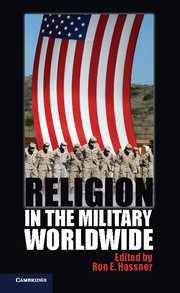Book contents
- Frontmatter
- Contents
- List of contributors
- Introduction
- Part I Rituals, Beliefs, and Practices
- Part II Religious Demographics in the Armed Forces
- Part III Religion and Military Operations
- Part IV Constitutional Challenges
- 8 United States I
- 9 United States II
- 10 Turkey
- Conclusion
- Contributor Biographies
- Index
- References
10 - Turkey
Published online by Cambridge University Press: 05 June 2014
- Frontmatter
- Contents
- List of contributors
- Introduction
- Part I Rituals, Beliefs, and Practices
- Part II Religious Demographics in the Armed Forces
- Part III Religion and Military Operations
- Part IV Constitutional Challenges
- 8 United States I
- 9 United States II
- 10 Turkey
- Conclusion
- Contributor Biographies
- Index
- References
Summary
The Turkish Republic is a secular country with a Muslim majority. Less than 1 percent of its population consists of non-Muslims. Even though Turkey has been a multiparty democracy since the 1950s, the Turkish Armed Forces (TAF) has traditionally enjoyed a very influential position in Turkish politics. The TAF has proven highly protective of Turkey’s secular identity and has intervened in Turkish politics multiple times to block Islamist influence. Despite its thoroughly secular founding principles, however, the TAF routinely employs religious rituals and symbols to increase troop morale, similar to its predecessor, the Ottoman military. Historically, the role and function of religion in the TAF has undergone significant changes, often in response to changing political environments.
This chapter sketches some of the contrasting tendencies that coexist in the TAF. We argue that Islamic symbols and practices in the contemporary military originated during the Ottoman Empire, where they played a central role. Its successor, the Turkish Republic, redefined the space allotted to Islam and chose to maintain an ambiguous relationship with religion. The Republic adopted a strict form of secularism that required the removal of Islam from the new military’s official training and institutional structure. Unlike the Ottoman military, the TAF does not retain official chaplains, and it confines the religious practices of troops to the private sphere. At the same time, the TAF routinely employs religious symbols and concepts to boost the combat morale of its soldiers. These include Islamic concepts, such as shahid (martyrdom) and ghazi (war veteran), which date back to the Ottoman Empire. Islamic symbols are also freely used when they are considered useful for enhancing social cohesion. Finally, the TAF treats its religious staff as temporary, creating their positions in an ad hoc manner for the duration of military campaigns. This further signifies the subordination of religion to the TAF’s secular principles.
Information
- Type
- Chapter
- Information
- Religion in the Military Worldwide , pp. 208 - 226Publisher: Cambridge University PressPrint publication year: 2013
References
Accessibility standard: Unknown
Why this information is here
This section outlines the accessibility features of this content - including support for screen readers, full keyboard navigation and high-contrast display options. This may not be relevant for you.Accessibility Information
- 2
- Cited by
